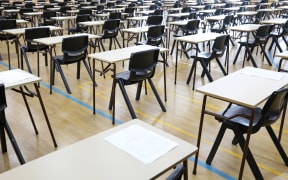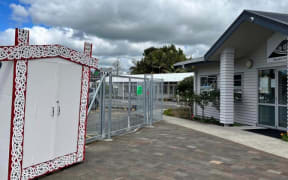
File photo. Photo: 123RF
New Zealand students may be some of the worst-behaved in the world.
Or they might just have less tolerance for disruption in the classroom.
An OECD survey of 15 year olds gave this country the bottom score among developed countries for classroom behaviour and one of the worst of the 81 participating nations and territories.
It found New Zealand teenagers were more likely than others in the OECD to report problems including noise and disorder, distraction from phones and digital devices, and students not listening to their teacher.
"Students in Aotearoa New Zealand reported relatively negative behavioural climate compared to most other countries in PISA, and the lowest amongst OECD countries. Similar to Aotearoa New Zealand were Brazil, Morocco, Bulgaria, Chile, Sweden and Uruguay. Australia, Canada and the UK all had much more positive behavioural climates in maths classrooms," the PISA 2022 Mathematics Achievement and Experiences of 15 year olds report said.
It also showed that higher levels of disruption were associated with lower scores in the PISA maths test.
New Zealand students who reported the best-behaved classes scored an average 512 points while those in the worst-behaved scored 468 points, a difference equivalent to more than two years of learning.
Some forms of disruption had a bigger effect than others.
New Zealand students who said teachers had to wait a long time for classroom noise to stop in most or all of their classes scored on average 31 points less than those who experienced the problem in some or none of their classes.
Students not starting work until long after a lesson started in most classes was associated with a 25-point drop in scores.
Digital device distraction in most lessons was associated with a 12-point drop in scores for New Zealand students while being distracted by others on devices in most lessons resulted in a 19-point fall.
The report said there were no significant differences in behaviour reported between any gender group, or between the most socio-economically advantaged and disadvantaged group of students.
Secondary Principals Association president Vaughan Couillault said it was a long bow to conclude New Zealand teens were the worst-behaved in the world.
He said it could be that New Zealand students were less likely than their peers in other countries to tolerate disruptive behaviour and more likely to call it out.
"I can't really compare and probably neither could the kids answering the survey what life is like in a classroom in Finland or life is like in a classroom in Singapore or life is like in a classroom in the Netherlands. I suppose our students have been taught to call out stuff when they don't like it. They've got a heightened sense of social justice and we create an environment where it's safe them to say 'I don't like the behaviour of the person sitting next to me'," he said.
However, Couillault said some students had difficulty adjusting to classroom behaviour expectations following school closures associated with the Covid-19 pandemic.
Post Primary Teachers' Association acting president Chris Abercrombie said in his experience New Zealand students were not badly behaved.
Since the pandemic started poor behaviour had not become more common but it had become more serious in nature, he said.
Abercrombie said high-quality teachers working in their areas of specialist knowledge were more likely to have well-behaved classrooms than teachers who were trying to cover unfamiliar subjects because of staff shortages.
"If we had the qualified, suitable teachers in each class and we know that there's issues finding maths teachers, science teachers, then that will help with these issues, particularly around maths anxiety because we know higher levels of maths anxiety correspond with poorer results," he said.
Big impact of teacher quality
The survey indicated teacher quality had a huge impact on student performance and New Zealand might have fewer of the best teachers than the OECD average.
Students were asked to rate their teachers out of 10 and New Zealand students awarded their maths teachers an average score of 6 out of 10, lower than the OECD average of 6.4.
The biggest difference from the OECD was in the percentage of students rating their maths teacher 9-10. Just 12 percent of New Zealand teens gave their teachers such a high rating, compared to the OECD average of 21 percent.
The 9 percent of New Zealand students who rated their teachers 1 or 2 out of 10 had much lower scores (446) than those who rated their teachers as a 9 or 10 out of 10 (525 points), a difference of 79 points or nearly four years of learning.
Across the OECD, the 21 percent of students who rated their maths teachers 9 or 10 had lower scores than those who rated their teachers 7 or 8 out of 10.
The report said New Zealand students from advantaged backgrounds rated their teachers higher than poorer students and students at boys' schools rated their teachers significantly higher than those in girls' or co-educational schools.
The study also found that students who received help from their maths teachers performed better in maths by about eight score points, but worried about the subject slightly more.
Teacher support exacerbated rather than reduced maths anxiety in only a few other countries including Japan and Argentina.
Some teaching practices were associated with better scores including asking students to explain their reasoning (+28 points), to memorise and apply rules (+32) and to keep trying (+24).
The study showed New Zealand students were more likely to feel bored in maths and did less homework than the OECD average.
"When students were asked about how they felt the last time they were in a maths class, half felt challenged quite a bit or extremely, half also said they were bored, significantly higher than the OECD average. Twenty percent felt inspired or motivated, lower than the OECD average," the report said.
"On days students did maths homework, most students said they did 30 minutes or less on it (68 percent), significantly less than the OECD average. When asked about per week, on average, students spent 30 minutes per week on maths homework, compared to an average of 48 minutes in the OECD.
"Students who spent between 30 minutes and an hour a day doing maths homework had the highest average maths score, about 23 points higher than students who did 30 minutes or less of homework. As homework time increases after an hour, average scores drop, suggesting these students do not necessarily complete more homework, but that the same amount homework takes them longer to complete."
New Zealand teens' performance dropped about 8 points in all socioeconomic groups except the poorest quarter, where the average score fell 24 points from 454 to 430.
Streaming New Zealand students into different maths classes based on their ability had almost no effect on their maths scores while streaming into ability groups within maths classes was associated with a seven-point drop in scores.





